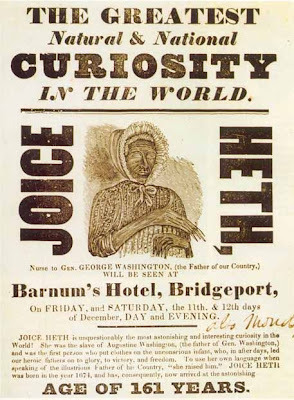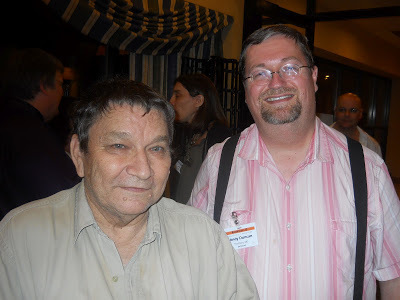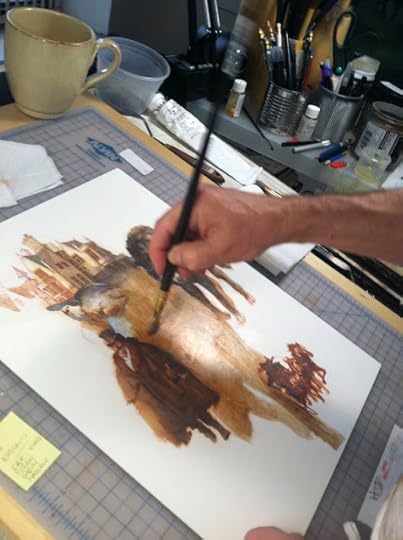Michael Swanwick's Blog, page 188
July 27, 2012
On the Road Again
.
As always, I am on the road again. This time I'm off to the land of Vikings, puffins, and moose. That's right . . . Canada!
I'll have reports from the road as I am able. In the meantime, please stand for the Canadian national anthem.
And for those of you who eat food . . .
Marianne and i were interviewed by Fran Wilde for her Cooking the Books feature about the intersection between genre fictio and food. You can find the interview -- and Marianne's receipe for Metaphysically Areferential Chicken -- here.
*
As always, I am on the road again. This time I'm off to the land of Vikings, puffins, and moose. That's right . . . Canada!
I'll have reports from the road as I am able. In the meantime, please stand for the Canadian national anthem.
And for those of you who eat food . . .
Marianne and i were interviewed by Fran Wilde for her Cooking the Books feature about the intersection between genre fictio and food. You can find the interview -- and Marianne's receipe for Metaphysically Areferential Chicken -- here.
*
Published on July 27, 2012 00:39
July 26, 2012
One Buff Bus
.

I'm spending the day packing. Meanwhile, for your edification . . . a bus that does push-ups.
This is not photoshopped or faked in any way. This is a real bus, really doing push-ups. It's art. By Czechoslovakian artist David Cerny. Who first came to the public's attention when he painted a tank being used as a Soviet war memorial pink. That was in 1991, when doing something like that was dangerous.
You can read about it here.
*

I'm spending the day packing. Meanwhile, for your edification . . . a bus that does push-ups.
This is not photoshopped or faked in any way. This is a real bus, really doing push-ups. It's art. By Czechoslovakian artist David Cerny. Who first came to the public's attention when he painted a tank being used as a Soviet war memorial pink. That was in 1991, when doing something like that was dangerous.
You can read about it here.
*
Published on July 26, 2012 00:30
July 25, 2012
A Novel Waiting to be Written
.

As part of my ongoing research into the thoughts and craft of Darger & Surplus, I've been reading a biography of P.T. Barnum. One of his early triumphs was the display of Joice Heth, a woman reputed by be 161 years old -- and the baby George Washington's nurse. She certainly looked the part. She was blind and largely paralyzed and wrinkled with age. But she was also an engaging conversationalist. She would tell tales about little George and sing a hymn. A gullible public ate it up.
And how did P.T. Barnum find her? He bought her from another showman. Ms Heth was a slave.
In later years, Barnum was ashamed of the incident -- not because he came to realize that owning a human being was wrong, but because when Joice Heth died, an autopsy revealed that she was in her seventies.
I think this story has got all the elements for a big novel: The world's greatest showman (and the first man to realize that the power of the media could be manipulated for commercial gain), the father of our country, and the greatest shame of American history, all wrapped up in one big package of fraud and humbuggery.
Plus, there's the personality of Ms Heth. Who, despite crippling infirmities, apparently lied her way into a comfortable gig where she was the center of attention. All accounts say that she had an engaging personality. Wouldn't you love to hear her side of the story?
All of this could be made serious art in the hands of somebody who has an ax to grind or a message to relate about racism or America or humbug or whatever. Me, I don't -- nothing, anyway, suited to this particular story. But surely there's somebody out there who does.
*

As part of my ongoing research into the thoughts and craft of Darger & Surplus, I've been reading a biography of P.T. Barnum. One of his early triumphs was the display of Joice Heth, a woman reputed by be 161 years old -- and the baby George Washington's nurse. She certainly looked the part. She was blind and largely paralyzed and wrinkled with age. But she was also an engaging conversationalist. She would tell tales about little George and sing a hymn. A gullible public ate it up.
And how did P.T. Barnum find her? He bought her from another showman. Ms Heth was a slave.
In later years, Barnum was ashamed of the incident -- not because he came to realize that owning a human being was wrong, but because when Joice Heth died, an autopsy revealed that she was in her seventies.
I think this story has got all the elements for a big novel: The world's greatest showman (and the first man to realize that the power of the media could be manipulated for commercial gain), the father of our country, and the greatest shame of American history, all wrapped up in one big package of fraud and humbuggery.
Plus, there's the personality of Ms Heth. Who, despite crippling infirmities, apparently lied her way into a comfortable gig where she was the center of attention. All accounts say that she had an engaging personality. Wouldn't you love to hear her side of the story?
All of this could be made serious art in the hands of somebody who has an ax to grind or a message to relate about racism or America or humbug or whatever. Me, I don't -- nothing, anyway, suited to this particular story. But surely there's somebody out there who does.
*
Published on July 25, 2012 07:36
July 24, 2012
Elmore Leonard's Eleventh Law
.Last week, I examined only the very surface of a long paragraph by Lucius Shepard and from it derived a few easy guidelines for gonnabe writers. Easy on the adjectives, I said. Get rid of those adverbs. Easy on the freakin' italics. And I might have pointed out (though I did not) how easily a great writer like Lucius gets along without exclamation points.
Then I sent those of you who are seriously working toward breaking into print back to their own work to cut until it hurt.
Today, I'd like to say . . . Or maybe not.
I have taught at all three Clarion Workshops (West, South, and Classic Coke) and if there's one thing the experience has taught me, it's that there's very little advice that applies to everybody. That's because writing is not a single skill. It's a family of related skills that produce a superficially similar end product. There are writers who cannot begin a story unless they know how it's going to end, and writers who cannot continue a story once they discover that exact same thing. There's no right type of writer or wrong type of writer. And you cannot change the type of writer you are by an act of will. Whatever type of writer you are, that's it.
To be trite (and triteness is one of those things we all advise you against; but sometimes it's necessary), it's like Kipling wrote:
Elmore Leonard once wrote a set of ten rules for writing that proved so popular that he expanded his commentary and published them as a book. A stunningly thin book, mind you. You can easily find these rules on the Web, usually with his commentary removed. They say things like: Keep your exclamation points under control and Never use an adverb to modify the word "said." All of them good advice and well worth considering seriously.
But if you read his commentary, you find that what he's telling you is how to write the way he does. Now, Elmore Leonard's prose is beautiful and elegant and worthy of all the admiration that has been heaped at its feet. But it's not the only way there is to write, and he not only knows it but actively wants not to discourage those other ways. So when he tells you to never open a book with weather, he immediately points out that those who can write like Barry Lopez and make the weather genuinely interesting are exempt from this rule. Don't go into great detail describing places and things, he commands, followed immediately by the observation that people who can write like Margaret Atwood or Jim Harrison can violate this rule with impunity.
So, implicit in what Leonard wrote is an eleventh rule: Don't follow rules if you can transcend them.
Because they're none of them really rules, after all. They're just helpful advice from somebody who's been there and wants to make it easier for you to learn to write well. As do I. As does pretty much everybody else who's ever committed writing advice to ink or pixels.
*
Then I sent those of you who are seriously working toward breaking into print back to their own work to cut until it hurt.
Today, I'd like to say . . . Or maybe not.
I have taught at all three Clarion Workshops (West, South, and Classic Coke) and if there's one thing the experience has taught me, it's that there's very little advice that applies to everybody. That's because writing is not a single skill. It's a family of related skills that produce a superficially similar end product. There are writers who cannot begin a story unless they know how it's going to end, and writers who cannot continue a story once they discover that exact same thing. There's no right type of writer or wrong type of writer. And you cannot change the type of writer you are by an act of will. Whatever type of writer you are, that's it.
To be trite (and triteness is one of those things we all advise you against; but sometimes it's necessary), it's like Kipling wrote:
There are nine and sixty ways of constructing tribal lays,Which is not to say you shouldn't be listening to the wisdom of those who have come before you. But if you give it a try and it's really, really not right for you, then there's no need to feel guilty about it. Because the iron law of art is that you can get away with anything you can get away with.
And every single one of them is right!
Elmore Leonard once wrote a set of ten rules for writing that proved so popular that he expanded his commentary and published them as a book. A stunningly thin book, mind you. You can easily find these rules on the Web, usually with his commentary removed. They say things like: Keep your exclamation points under control and Never use an adverb to modify the word "said." All of them good advice and well worth considering seriously.
But if you read his commentary, you find that what he's telling you is how to write the way he does. Now, Elmore Leonard's prose is beautiful and elegant and worthy of all the admiration that has been heaped at its feet. But it's not the only way there is to write, and he not only knows it but actively wants not to discourage those other ways. So when he tells you to never open a book with weather, he immediately points out that those who can write like Barry Lopez and make the weather genuinely interesting are exempt from this rule. Don't go into great detail describing places and things, he commands, followed immediately by the observation that people who can write like Margaret Atwood or Jim Harrison can violate this rule with impunity.
So, implicit in what Leonard wrote is an eleventh rule: Don't follow rules if you can transcend them.
Because they're none of them really rules, after all. They're just helpful advice from somebody who's been there and wants to make it easier for you to learn to write well. As do I. As does pretty much everybody else who's ever committed writing advice to ink or pixels.
*
Published on July 24, 2012 07:04
July 23, 2012
Ferrogmagnetic Monday
.
It's hot as hot and I can't seem to work up the energy to do the writing that needs to be done. Not even the simple chore of keeping this blog fed. So here's a nifty video instead.
Enjoy.
*
It's hot as hot and I can't seem to work up the energy to do the writing that needs to be done. Not even the simple chore of keeping this blog fed. So here's a nifty video instead.
Enjoy.
*
Published on July 23, 2012 12:34
July 21, 2012
Two Rogues
.

Do you recognize these two men? You should. That's Howard Waldrop to the left and, behind him, Andy Duncan. They don't look very trustworthy, do they? I'm thinking they'd make a great pair of Depression-era Dust-Bowl grifters. If I didn't already have a buddy team of con men going, I'd start this story in a heartbeat.
So should you trust them? With your life, your money, and your sacred honor, you betcha! But their stories? No. These guys tell terrible whoppers. Isaak Walton and John Bunyan fishing in the Slough of Despond? Flannery O'Conner's chicken? Cut me some slack!
Nice guys, though.
*

Do you recognize these two men? You should. That's Howard Waldrop to the left and, behind him, Andy Duncan. They don't look very trustworthy, do they? I'm thinking they'd make a great pair of Depression-era Dust-Bowl grifters. If I didn't already have a buddy team of con men going, I'd start this story in a heartbeat.
So should you trust them? With your life, your money, and your sacred honor, you betcha! But their stories? No. These guys tell terrible whoppers. Isaak Walton and John Bunyan fishing in the Slough of Despond? Flannery O'Conner's chicken? Cut me some slack!
Nice guys, though.
*
Published on July 21, 2012 08:23
July 20, 2012
Listening to Writers Read
.

One of the best pieces of advice I have for gonnabe writers is this: While you're still unpublished, go to lots of readings and public appearances by writers you know are good. That way, when it's your turn and almost nobody shows up or the audience is sullen and unappreciative you'll recognize it as normal and won't slit your throat.
This advice would have been useless, however, at my reading at the Wise Owl Bookstore in West Reading, PA, this past Wednesday. The store was packed and the audience was both appreciative and very smart. So I had a lovely time.
What made the evening, though, was that I was wise enough to show up early for the open mic hour, when local writers and poets get up to read from their work. It's been many years since I last did that, and I'd forgotten how much fun such events could be. Listening, one can hear where the writers are on their pilgrimage: Some just setting out, others just making their first sales, one or two at that point where everything comes together. And occasionally, something very fine indeed is read.
The event was conducted with aplomb and good grace by Sue Lange, and fterward, most of us retired to a nearby restaurant for food and talk. If you're in the area for one of these events, I highly recommend it.
And lest we forget . . .
Apollo 11 landed on the Moon forty-three (dear God! can this be true?) years ago today, on July 20, 1969. It was an astonishing accomplishment which I stayed up late to watch live on black-and-white television.
In retrospect, it was madness to attempt to reach the Moon with the primitive technology available back then. But as it turns out it was the wise thing to do. Today we have the technology but not the will. If we'd waited, the deed might still remain undone.
*

One of the best pieces of advice I have for gonnabe writers is this: While you're still unpublished, go to lots of readings and public appearances by writers you know are good. That way, when it's your turn and almost nobody shows up or the audience is sullen and unappreciative you'll recognize it as normal and won't slit your throat.
This advice would have been useless, however, at my reading at the Wise Owl Bookstore in West Reading, PA, this past Wednesday. The store was packed and the audience was both appreciative and very smart. So I had a lovely time.
What made the evening, though, was that I was wise enough to show up early for the open mic hour, when local writers and poets get up to read from their work. It's been many years since I last did that, and I'd forgotten how much fun such events could be. Listening, one can hear where the writers are on their pilgrimage: Some just setting out, others just making their first sales, one or two at that point where everything comes together. And occasionally, something very fine indeed is read.
The event was conducted with aplomb and good grace by Sue Lange, and fterward, most of us retired to a nearby restaurant for food and talk. If you're in the area for one of these events, I highly recommend it.
And lest we forget . . .
Apollo 11 landed on the Moon forty-three (dear God! can this be true?) years ago today, on July 20, 1969. It was an astonishing accomplishment which I stayed up late to watch live on black-and-white television.
In retrospect, it was madness to attempt to reach the Moon with the primitive technology available back then. But as it turns out it was the wise thing to do. Today we have the technology but not the will. If we'd waited, the deed might still remain undone.
*
Published on July 20, 2012 06:57
July 19, 2012
A Paragraph from Lucius Shepard's Skull and the Lessons I Want You to Learn From It
.

At Readercon recently, I chanced to mention to Ken Houghton that I had just bought Lucius Shepard's new Subterranean Press collection The Dragon Griaule , despite the fact that it cost forty-five bucks and contained only one story I hadn't read before. There aren't many people who can inspire me to spend that much money for a single story. But Lucius is one of the great writers of our times and the Dragon Griaule stories, taken collectively are a major work of fantasy. So I snatched it up.
Anyway, I chanced to mention to Ken that I planned to review the new story, The Skull, here as soon as I read it. On Friday, Ken asked when he'd see the review and I replied, "Soon, soon."
Then I started reading the story.
Lingering over it.
Discovering that I was in no hurry to reach the end.
In fact, I started thinking I might go the very first story in the sequence, The Man Who Painted the Dragon Griaule , and read through the complete saga first. After which I thought, maybe I'll read through all the stories in Tachyon Publications' neew Sword & Sorcery anthology first, to immerse myself in the distant sources of Lucius's series.
Because for all our analysis and critical ideation, fiction is first and foremost a visceral pleasure, even a sensuous one. And there is no reason for us to rush through our pleasures.
So I may be some time at this one.
And for all those gonnabe writers in need of tough love out there . . .
Take a look at the second full paragraph of The Skull . The first full paragraph details how, after the destruction of the Dragon Griaule, his skull was transported at enormous expense and difficulty through the jungle over the course of decades to a distant capital city. Only to arrive after the tyrant who ordered this feat done had died.
Here's what comes next:
Okay. Have you studied that paragraph carefully? Beautiful stuff, eh? Now take a good look at what it doesn't contain. It has very few adjectives and only two adverbs.
Next, boot up the story you're working on right now and do a search for "ly" -- see how many adverbs you've got? Most of them are not only not needed but actually weaken your prose line. You should go through the text and remove most of them. Including every adverb that appears after the word "said" (or intoned or hooted or snorted or plainsonged or whatever) -- those are signs of insecurity on your part. You don't trust the dialog to sound menacing so you specify it's said "menacingly." You don't trust the courtesan's words to sound flirty so she says them "flirtily." You don't trust the king's assent to sound grudging so he says them "grudgingly."
If that's not clear in the words, well, you need clearer words. Not an apologetic adverb to come on stage and say, "Here's what the dialog was meant to convey."
Now take a look at the overgrown serpent-infested jungle of unnecessary, insistent, opalescent adjectives which clutter the lucidly pristine prose you are trying to put down on the dark and stormy page. Compare your prose to Lucius's. Notice how much more effective his is?
Get our your machete. Start chopping. Don't stop until you're standing knee-deep in blood.
All done? Excellent. Here's a tissue. I know that hurt, but it's a lesson that all serious writers have to learn if they want to walk in Lucius Shepard country someday. I can't say that it's for your own good. But it's for the good of your fiction.
Oh, and all those bleeping italics? Get rid of them too.
*


At Readercon recently, I chanced to mention to Ken Houghton that I had just bought Lucius Shepard's new Subterranean Press collection The Dragon Griaule , despite the fact that it cost forty-five bucks and contained only one story I hadn't read before. There aren't many people who can inspire me to spend that much money for a single story. But Lucius is one of the great writers of our times and the Dragon Griaule stories, taken collectively are a major work of fantasy. So I snatched it up.
Anyway, I chanced to mention to Ken that I planned to review the new story, The Skull, here as soon as I read it. On Friday, Ken asked when he'd see the review and I replied, "Soon, soon."
Then I started reading the story.
Lingering over it.
Discovering that I was in no hurry to reach the end.
In fact, I started thinking I might go the very first story in the sequence, The Man Who Painted the Dragon Griaule , and read through the complete saga first. After which I thought, maybe I'll read through all the stories in Tachyon Publications' neew Sword & Sorcery anthology first, to immerse myself in the distant sources of Lucius's series.
Because for all our analysis and critical ideation, fiction is first and foremost a visceral pleasure, even a sensuous one. And there is no reason for us to rush through our pleasures.
So I may be some time at this one.
And for all those gonnabe writers in need of tough love out there . . .
Take a look at the second full paragraph of The Skull . The first full paragraph details how, after the destruction of the Dragon Griaule, his skull was transported at enormous expense and difficulty through the jungle over the course of decades to a distant capital city. Only to arrive after the tyrant who ordered this feat done had died.
Here's what comes next:
Adilberto's obsessions were not those of his father. He spent the bulk of his reign pursuing wars of aggression against neighboring states and the skull became a roosting place for birds, home to monkeys, snakes, and palm rats, and was overgrown by vines and fungus. His son, a second and lesser Adilberto, restored the skull to a relatively pristine condition, transformed the land around it into an exotic garden, bronzed the enormous fangs and limned its eye sockets and jaw with brass, jade and copper filigrees that accentuated its sinister aspects and inspired the creation of tin masks that years later came to be sold in the tourist markets. He adorned the interior with teak and ebony furnishings, with gold, silk and precious stones, and therein held bacchanals that established new standards for debauchery (murder, torture, and rape were commonplace at these revels) and contributed greatly toward bankrupting an economy already decimated by the excesses of Adilberto I and Carlos VIII.
Okay. Have you studied that paragraph carefully? Beautiful stuff, eh? Now take a good look at what it doesn't contain. It has very few adjectives and only two adverbs.
Next, boot up the story you're working on right now and do a search for "ly" -- see how many adverbs you've got? Most of them are not only not needed but actually weaken your prose line. You should go through the text and remove most of them. Including every adverb that appears after the word "said" (or intoned or hooted or snorted or plainsonged or whatever) -- those are signs of insecurity on your part. You don't trust the dialog to sound menacing so you specify it's said "menacingly." You don't trust the courtesan's words to sound flirty so she says them "flirtily." You don't trust the king's assent to sound grudging so he says them "grudgingly."
If that's not clear in the words, well, you need clearer words. Not an apologetic adverb to come on stage and say, "Here's what the dialog was meant to convey."
Now take a look at the overgrown serpent-infested jungle of unnecessary, insistent, opalescent adjectives which clutter the lucidly pristine prose you are trying to put down on the dark and stormy page. Compare your prose to Lucius's. Notice how much more effective his is?
Get our your machete. Start chopping. Don't stop until you're standing knee-deep in blood.
All done? Excellent. Here's a tissue. I know that hurt, but it's a lesson that all serious writers have to learn if they want to walk in Lucius Shepard country someday. I can't say that it's for your own good. But it's for the good of your fiction.
Oh, and all those bleeping italics? Get rid of them too.
*
Published on July 19, 2012 08:49
July 18, 2012
An Apology to Jeff VanderMeer
.Jeff VanderMeer just wrote to tell me he's upset at the "cheap shot" I took at him in yesterday's post.
That was absolutely not my intention. Every word I wrote about him was meant to express my admiration for his efforts on behalf of Amos Tutuola's legacy and memory.
But if Jeff could misunderstand what I wrote, so can others. So I will state this as simply and clearly as possible.
Jeff and his wife Ann are literary heroes for all they've done on Tutuola's behalf. They've complied a forthcoming e-book collection of his uncollected stories, Don't Return Bad for Bad . Jeff interviewed Yinka Tutuola, the fantasist's son, at length and put the interview up on the Web, making much useful information available to all. And from things he said on the panel, I got the impression that he had quietly engaged in other good works as well.
On the panel, VanderMeer was strikingly modest about his part in all this. Had I done a fraction of what he has done for Tutuola, I would have been quite chuffed about it. He, however, referred to his own achievements only when absolutely necessary. This is what I meant when I said that I was impressed by how "not-full-of-himself" he was.
I am horrified that my words could be interpreted as anything but praise. And I apologize for my not making my intentions sufficiently lucid.
*
That was absolutely not my intention. Every word I wrote about him was meant to express my admiration for his efforts on behalf of Amos Tutuola's legacy and memory.
But if Jeff could misunderstand what I wrote, so can others. So I will state this as simply and clearly as possible.
Jeff and his wife Ann are literary heroes for all they've done on Tutuola's behalf. They've complied a forthcoming e-book collection of his uncollected stories, Don't Return Bad for Bad . Jeff interviewed Yinka Tutuola, the fantasist's son, at length and put the interview up on the Web, making much useful information available to all. And from things he said on the panel, I got the impression that he had quietly engaged in other good works as well.
On the panel, VanderMeer was strikingly modest about his part in all this. Had I done a fraction of what he has done for Tutuola, I would have been quite chuffed about it. He, however, referred to his own achievements only when absolutely necessary. This is what I meant when I said that I was impressed by how "not-full-of-himself" he was.
I am horrified that my words could be interpreted as anything but praise. And I apologize for my not making my intentions sufficiently lucid.
*
Published on July 18, 2012 06:42
July 17, 2012
Gregory Manchess At Work
.

Artist Gregory Manchess has posted an illustrated account at Tor.com of how he created the cover illos for my first two Mongolian Wizard stories. Dear God, the the art director worked him like a horse!
But, from my perspective at least, it was worth it.
I have a superstitious belief that certain stories are fated for success, and that this begins with their getting extraordinary art. The Jeff Jones covers for Ace Books' reissue of Fritz Leiber's Fafhrd and the Grey Mouser books comes to mind, or the painting that James Gurney did for the issue of F&SF with Lucius Shepard's original Dragon Griaule story.
So, too, I dare hope, for the adventures of Ritter and Sir Toby. They have a hard war and my own high expectations ahead of them. But getting two such illustrations at their outset seems a good sign. I intend to take it as an omen.
I was struck by how vivid and filled with movement Manchess's first sketches were. Then by how each change and artistic decision made the paintings better. It's a glorious thing to watch a professional at work.
Particularly when you're the one who ultimately benefits from it.
You can view the entire article (and it's well worth viewing) here.
And speaking of Amos Tutuola . . .
As I'd hoped, I learned a lot at the Readercon panel on Amos Tutuola. But what knocked me out was how not-full-of-himself fellow panelist Jeff VanderMeer was. As a spin-off, apparently, of his and Ann VanderMeer's telephone-directory of an anthology, Weird , the VanderMeers have been working with Yinka Tutuola, the great writer's son and the manager of his literary estate. Among other activities, they've assembled an e-book of uncollected Tutuola stories titled Don't Return Bad for Bad , forthcoming soon from Cheeky Frawg. And Jeff conducted an extremely valuable interview with the younger Mr. Tutuola, which greatly expands our understanding of the writer.
You can find the interview here.
*

Artist Gregory Manchess has posted an illustrated account at Tor.com of how he created the cover illos for my first two Mongolian Wizard stories. Dear God, the the art director worked him like a horse!
But, from my perspective at least, it was worth it.
I have a superstitious belief that certain stories are fated for success, and that this begins with their getting extraordinary art. The Jeff Jones covers for Ace Books' reissue of Fritz Leiber's Fafhrd and the Grey Mouser books comes to mind, or the painting that James Gurney did for the issue of F&SF with Lucius Shepard's original Dragon Griaule story.
So, too, I dare hope, for the adventures of Ritter and Sir Toby. They have a hard war and my own high expectations ahead of them. But getting two such illustrations at their outset seems a good sign. I intend to take it as an omen.
I was struck by how vivid and filled with movement Manchess's first sketches were. Then by how each change and artistic decision made the paintings better. It's a glorious thing to watch a professional at work.
Particularly when you're the one who ultimately benefits from it.
You can view the entire article (and it's well worth viewing) here.
And speaking of Amos Tutuola . . .
As I'd hoped, I learned a lot at the Readercon panel on Amos Tutuola. But what knocked me out was how not-full-of-himself fellow panelist Jeff VanderMeer was. As a spin-off, apparently, of his and Ann VanderMeer's telephone-directory of an anthology, Weird , the VanderMeers have been working with Yinka Tutuola, the great writer's son and the manager of his literary estate. Among other activities, they've assembled an e-book of uncollected Tutuola stories titled Don't Return Bad for Bad , forthcoming soon from Cheeky Frawg. And Jeff conducted an extremely valuable interview with the younger Mr. Tutuola, which greatly expands our understanding of the writer.
You can find the interview here.
*
Published on July 17, 2012 00:30
Michael Swanwick's Blog
- Michael Swanwick's profile
- 546 followers
Michael Swanwick isn't a Goodreads Author
(yet),
but they
do have a blog,
so here are some recent posts imported from
their feed.



